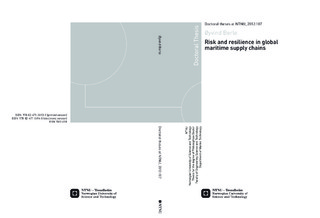| dc.contributor.author | Berle, Øyvind | nb_NO |
| dc.date.accessioned | 2014-12-19T12:08:34Z | |
| dc.date.available | 2014-12-19T12:08:34Z | |
| dc.date.created | 2013-02-07 | nb_NO |
| dc.date.issued | 2012 | nb_NO |
| dc.identifier | 603884 | nb_NO |
| dc.identifier.isbn | 978-82-471-3493-1, h. | nb_NO |
| dc.identifier.isbn | 978-82-471-3494-8 | nb_NO |
| dc.identifier.uri | http://hdl.handle.net/11250/238358 | |
| dc.description.abstract | Why did they make birds so delicate and fine as those sea swallows when the ocean can be so cruel? She is kind and very beautiful. But she can be so cruel and it comes so suddenly and such birds that fly, dipping and hunting, with their small sad voices are made too delicately for the sea" - Ernest Hemingway, “The old man and the sea”.
The background of this research, given the central condition that the world is completely dependent on maritime transportation systems, is to understand how these systems are vulnerable towards disruptions, what the consequences are if the transportation systems should break down, and how one may give the systems the ability to restore their ability to move goods after a disruption has occurred.
The mission of the system is to move goods, hence the focus on protecting the mission rather than the infrastructure itself. The prevalence of low-frequency high-impact scenarios; events that have a low probability but may cause great harm to the system, give the ground for why not all efforts should be directed towards preventing disruptions from occurring. Disruptions are bound to occur, how may the systems be prepared to cope with these events?
Cases within transportation of Liquefied Natural Gas (LNG) and humanitarian logistics are used to illustrate the problem and the approach to coping with such problems.
The research part of the doctoral thesis can be divided into five thematic areas: TA1: Energy security, in particular for natural gas and global LNG transportation systems TA2: Understanding of maritime transportation system failures, in particular for lowfrequency high-impact scenarios TA3: Methods for systematically addressing how systems fail and how these may be made less vulnerable TA4: The relevance of maritime transportation systems in humanitarian relief operations, and how to strengthen these TA5: The interaction between supply chain risk assessment and LNG transportation system optimization
Contributions from the research can be summed up as: C1: An overview of the critical functions necessary for a maritime transportation system’s ability to move goods. C2: A framework for systematically addressing vulnerabilities in maritime transportation systems, treating both operational and low-frequency high-impact risks, as well as incorporating cost/efficiency criteria in the assessment. C3: The insight and understanding of failure and restoration of maritime transportation systems is applicable to humanitarian relief logistics, where the application of principles from commercial supply chain management is immature. C4: Combining supply chain risk assessment with optimization tools for an LNG supply chain increases the robustness and resilience of the system and thereby the energy security of the recipients, while ensuring efficient resource usage of the supply chain. | nb_NO |
| dc.language | eng | nb_NO |
| dc.publisher | NTNU | nb_NO |
| dc.relation.ispartofseries | Doktoravhandlinger ved NTNU, 1503-8181; 2012:107 | nb_NO |
| dc.relation.haspart | Berle, Oyvind; Rice, James B., Jr.; Asbjornslett, Bjorn Egil. Failure modes in the maritime transportation system. Maritime Policy & Management. (ISSN 0308-8839). 38(6): 605-632, 2011. <a href='http://dx.doi.org/10.1080/03088839.2011.615870'>10.1080/03088839.2011.615870</a>. | nb_NO |
| dc.relation.haspart | Berle, Oyvind; Asbjornslett, Bjorn Egil; Rice, James B.. Formal Vulnerability Assessment of a maritime transportation system. Reliability Engineering & System Safety. (ISSN 0951-8320). 96(6): 696-705, 2011. <a href='http://dx.doi.org/10.1016/j.ress.2010.12.011'>10.1016/j.ress.2010.12.011</a>. | nb_NO |
| dc.relation.haspart | Berle, Ø.; Spens, K; Asbjørnslett, B.E.. The role of maritime transportation in humanitarian logistics. . | nb_NO |
| dc.relation.haspart | Berle, Ø; Norstad, I; Asbjørnslett, B.E.. Optimization, risk assessment and resilience in LNG transportation systems. Supply Chain Management: An International Journal. (ISSN 1359-8546). | nb_NO |
| dc.title | Risk and resilience in global maritime supply chains | nb_NO |
| dc.type | Doctoral thesis | nb_NO |
| dc.contributor.department | Norges teknisk-naturvitenskapelige universitet, Fakultet for ingeniørvitenskap og teknologi, Institutt for marin teknikk | nb_NO |
| dc.description.degree | PhD i marin teknikk | nb_NO |
| dc.description.degree | PhD in Marine Technology | en_GB |

